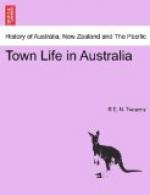In Victoria, especially, the boys are inordinately fond of games and outdoor sports of every kind; but too many of the day-boys prefer playing cricket and football with local clubs to joining in the school games, and this makes esprit de corps only possible between school and school. There are no divisions sufficiently strongly marked in the school to become parties. Sixth and school are perhaps the nearest approaches; but the day is far distant when intellectual differences will be appreciated by grown-up colonists, much more by schoolboys; and it is only in a few schools where a ‘sixth’ and ‘school’ match is possible. Untidiness in dress, and indeed in all of their belongings, is another of the colonial schoolboys’ weaknesses. At the Melbourne Grammar School the boys have studies which they in a certain way appreciate; but they are quite content with the bare floor and walls, and would despise the little attempts at comfort and prettiness which an English boy makes. The latter’s pride in his study would be quite incomprehensible to the colonial, who not unnaturally imbibes his ideas from the rough-and-ready mode of living in his home. As for uniformity in dress, he would be a bold master who would even attempt to carry it out.
What I have written of the grammar-schools and denominational colleges of course applies more or less to all secondary schools. There is at this moment near Melbourne a private-venture college, which, owing to the great ability and reputation of its head, ranks with the best Victorian grammar schools. I should doubt whether the tone that is possible in a non-proprietary school can easily be brought about in a private one, but in teaching power it is certainly not inferior. With this one exception, the private-venture colleges established in each suburb of the different capitals are little better than the commercial academies of England. There is the same bad tone, want of sufficient numbers of boys of equal standing in the school-work, and other disadvantages, which make the very name of a private school malodorous. The boys are rough and unmannerly, the discipline slack, the teaching staff inferior in ability and social position. The public schools of Australia may not be all that could be wished, but [Greek characters] that a boy of mine should ever go to a colonial private school, unless it were a preparatory school—a class of institution greatly needed and not yet provided, because parents do not appreciate the need.
The existence of three universities in a country with less than two million inhabitants speaks well for the colonists’ appreciation of the higher instruction, which they themselves have rarely had the opportunity of enjoying. The Sydney University, founded in 1851, was the first in the field, but in spite of fine buildings, affiliated colleges, able professors, and a very fair supply of funds, it has never succeeded in attracting any considerable number of students,




